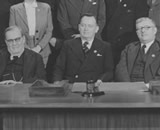Global Engagement
By 1945 the Curtin Government had ratified the Statute of Westminster, signed Australia's first international treaty, actively participated in the development of the United Nations and commenced negotiations to implement the Bretton Woods Agreement. These developments paved the way for Australia to engage more fully in the rapidly changing postwar world.
Securing Australia's ratification of the Agreement was one of the most politically difficult but important achievements of the Curtin and Chifley Governments in preparing Australia for its place in the postwar world of international trade and economics. After a long and tense set of negotiations within the Australian Labor Party parliamentary acceptance of the Bretton Woods Agreement was finally secured in March 1947.
ustralian Minister for Foreign Affairs Dr Herbert Evatt played an especially prominent role at the April 1945 San Francisco meeting for the establishment of the United Nations, arguing that the veto proposal should be limited 'except in cases of emergency' and with provision for 'a majority of the great powers to take enforcement action against aggression' notwithstanding a veto by one or more of the great powers. He also opposed the big powers having 'unrestricted power' to veto any proposed change to the United Nations Charter. More broadly, he urged that the General Assembly should 'be given powers and functions which would enable it to be the central body of the world organisation' [Hasluck, The Government and the People 1942-1945, p. 504]; and that 'Australia and other lesser powers exercise leadership so as to moderate big power supremacy'. [Crockett, Evatt A Life, p. 216]
unsuccessfully that the 'big five'
powers should give up their power of
veto.
The concert of Europe cartoon by Ted
Scorfield. The Bulletin, 10 October
1945.

s.jpg)
Francisco for the United Nations
conference. Left to right: Deputy Prime
Minister Frank Forde and Minister for
External Affairs, Dr Herbert Evatt
Courtesy National Library of
Australia: Pic an23236247
Courtesy National Archives of Australia:
A6180 23/8/79/118
